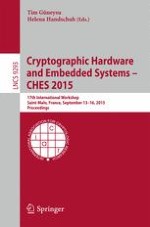2015 | OriginalPaper | Chapter
Secure Key Generation from Biased PUFs
Authors : Roel Maes, Vincent van der Leest, Erik van der Sluis, Frans Willems
Published in: Cryptographic Hardware and Embedded Systems -- CHES 2015
Publisher: Springer Berlin Heidelberg
Activate our intelligent search to find suitable subject content or patents.
Select sections of text to find matching patents with Artificial Intelligence. powered by
Select sections of text to find additional relevant content using AI-assisted search. powered by
